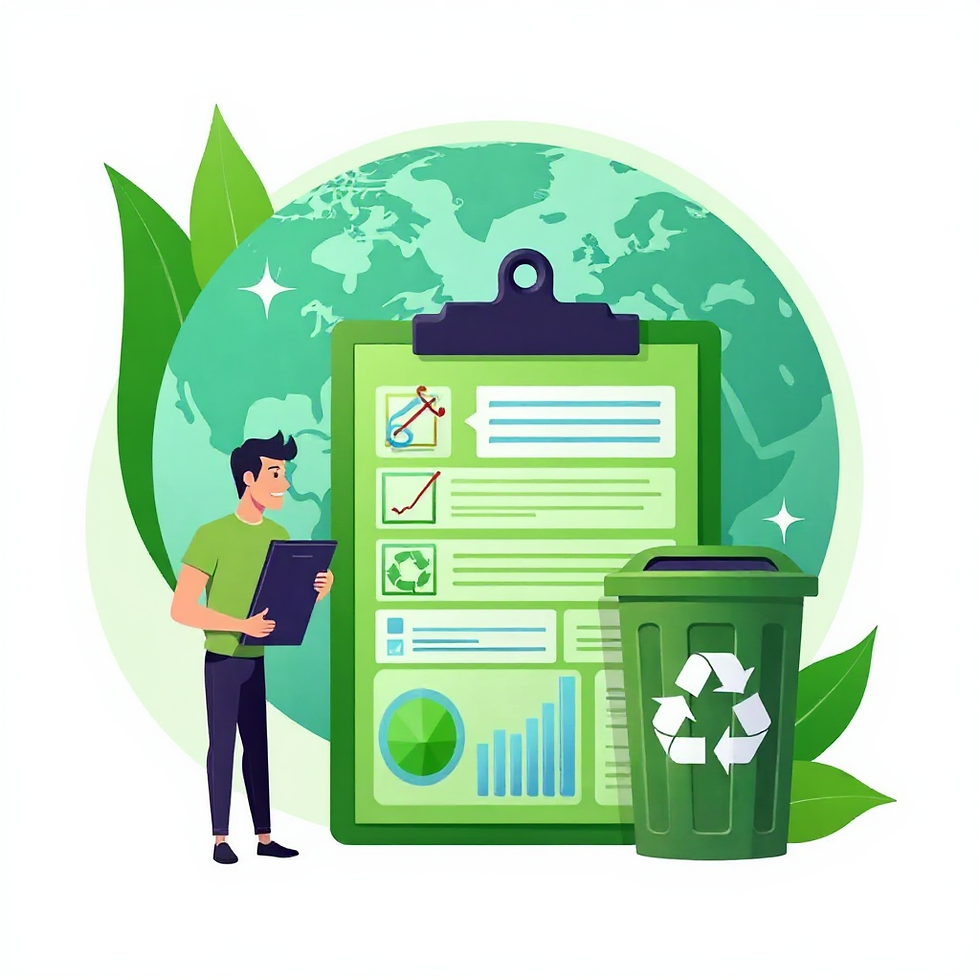How Data Transforms Waste from a Cost to an Asset
- Jaskaran Singh

- Apr 21, 2025
- 2 min read
Ever thought of waste as cash in disguise? It’s just raw material in the wrong spot and the right data can flip it into gold.
In our little adventure helping businesses, we’ve seen it first-hand: waste, when managed smartly, isn’t a burden. It’s a financial asset.
Waste to value? Oh, it’s real. The secret sauce? Data, specifically systems that track and dissect waste streams like a treasure hunter with a map.

The Value Hidden in Waste
Every dumpster hides a gem, if you know where to look. Without precise data, those gems stay buried. Take a client of ours: we dug into their bins and found 27 kgs of Aluminium cans in with the general waste. That’s 50 AED going into the landfill. Fifty bucks might not sound like much. Multiply it across a year, and it starts to add up, lost forever if our deep waste analysis hadn’t cracked the case. Data’s the game-changer here, turning “oops” into opportunity.
Case Study: Bob’s Red Mill
Need proof? Meet Bob’s Red Mill, a natural foods crew that nailed it. By tracking carbon emissions and energy use, they spotted inefficiencies, then slashed energy waste while boosting output. Less trash, more profit. Sustainability and success, holding hands. (Who knew data could play matchmaker?)
Closer to home, an F&B company (name TBD—permissions pending) did the same. They measured emissions, ditched those sneaky PE-lined paper cups (The Paper Cup Problem), and switched to full paper versions. Smarter vendors are being bought on board, cutting costs and amplifying impact. Then there’s SIG, turning beverage cartons, specifically that tricky poly-al layer, into tiles. Tiles for products. Products for resale. Waste to value, step by step.
The Role of Data and Technology in Waste Valorisation
Here’s where tech and data team up like superheroes. Our systems spot recyclables, streamline sorting (our waste is 80% cleaner than the usual haul) and AI kicks it up a notch.
Systemic change, incoming!
In Europe, AI tracks palm oil and soy origins to dodge deforestation rules, keeping waste down and sourcing sustainable. Data’s not just a tool, it’s the engine driving this waste-to-wealth revolution.
Financial Incentives and Market Opportunities
Why stop at savings? Recycling and repurposing can create new cash flows. Materials you’d dispose of can become products to sell, feeding the circular economy. Check our work with Expo and Arabian Warrior, waste data turned them into market players. Their medals were made with post-consumer plastic bottle caps. Without our data pushing it, you’re leaving money on the table. With it, you’re ahead of the game. Which side are you on?
Conclusion
Turning waste from a cost to an asset isn’t a pipe dream, it’s a data-driven reality. Dig into your waste streams, and you’ll;
Discover value.
Cut environmental harm.
Boost profits.
It starts with seeing waste as a resource begging to be tapped and data’s the key to unlock it.
Quick question: What’s the last thing you threw out worth? Chances are, you don’t know and neither do most businesses. Stop throwing away money. Let’s track, sort, and upcycle together. #WasteToValue
_edited.png)



Comments